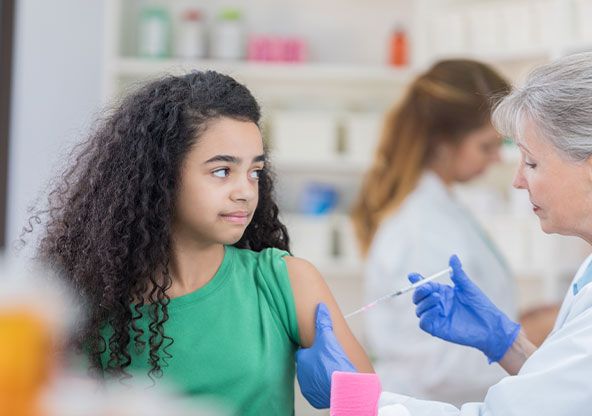Setting the Record Straight on COVID-19 Vaccines and Infertility

With so much misinformation about COVID-19 vaccines, parents, especially parents of teenagers, find themselves confronted with challenging questions that they may not know how to answer.
Among teenagers’ and parents' top concerns about vaccines is whether or not they cause infertility later in life.
“It’s unfortunate this rumor is swirling around because there’s zero evidence of this occurring. It’s a theoretical risk that’s never been shown in any animal model to exist,” said Dr. Shad Deering, a maternal-fetal medicine specialist at CHRISTUS Children's.
Origin of Misinformation
This idea that the vaccines cause issues with fertility originated from a doctor who recognized something on the COVID-19 spike protein – on the virus itself, that was similar to a protein found in human placentas.
The doctor thought that the vaccine might make antibodies against that protein and could affect placentas and pregnancies. But COVID-19 vaccines don’t even cause that protein to be produced, and there have been studies of placentas of women who received the vaccine and there are no differences between them and women who didn’t get the vaccine.
According to Dr. Deering, unfortunate conclusions were quickly made, and soon after the information went viral and exploded on social media.
“There are inherent risks with anything we put in our bodies, from vitamin supplements to coffee and even chicken nuggets and we don’t know how those substances will affect us 10-20 years from now. In the case of the vaccine, the benefits of getting it greatly outweigh the risks,” said Deering.
A Seemingly Quick Development
Teenagers may question the safety of the vaccines because of how quickly they were rolled out.
Deering said the mRNA technology isn’t new – it’s been around for years. In fact, Dr. Katalin Karikó, the scientist who was instrumental in developing ways to use it in medical treatments, has been working with mRNA since the 1990s. Additionally, the COVID vaccines now available were thoroughly tested before they were administered to the public and since they were introduced there has been ongoing research showing the vaccines are safe and effective.
“The process was sped up because we needed an answer to help curb the pandemic. I think most of us are used to hearing vaccines take four to eight years to develop, but if you think about it, does it really have to take that long? With this vaccine, all of the red tape that researchers usually face was taken away which sped this vaccine up significantly while still keeping all of the safety protocols in place,” said Deering.
Pregnant Women Should Get Vaccinated
While the connection between COVID-19 vaccines and infertility is unfounded, the risks associated with being pregnant and contracting the virus are, in fact, real, which is why the medical community is strongly encouraging pregnant women to get vaccinated.
“There are few things more difficult than seeing a pregnant woman, and sometimes her baby if it happens when too early in pregnancy, die from a disease that could have been prevented with a vaccine,” said Deering.
There is also a chance that seemingly healthy young people are at risk of developing severe issues after they contract COVID. For example, CHRISTUS Children's has seen cases of adolescents and teenagers developing myocarditis (inflammation of the heart) after a COVID infection.
“What it comes down to is getting COVID-19 and the possibility of becoming severely ill and dealing with the long-term effects of the virus versus getting the vaccine which carries minimal short-term. While we know the vaccine doesn’t cause infertility, what hasn’t been studied are the long-term effects of actually getting COVID-19,” said Deering. “Parents, especially teens, need to take the time to arm themselves with trustworthy information sources so they can help debunk some of the myths.”
